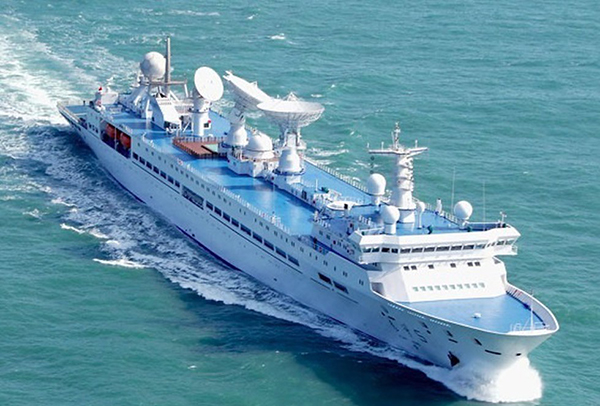Yuan Wang 5 is capable of tracking missiles & satellites
Maj Gen Deepak Mehta
A Chinese ship able to track ballistic missiles and satellites headed for Sri Lanka’s Hambantota port, in early August, raising security concerns in India. The move coincided with the Chinese build-up off Taiwan coast that started with US House Speaker Nancy Pelosi’s visit.
After first denying reports of its expected arrival at Hambantota port, Sri Lanka’s defence ministry confirmed, on 6 August, that Yuan Wang 5, which can track satellites and intercontinental ballistic missiles, would be docking at the port between 11 and 17 August.
Under pressure from the Indian government, the Sri Lankan government asked the Chinese government to defer the visit of its space-satellite tracker ship Yuan Wang 5 at Hambantota port “until further consultations” were made between the two governments. It was finally cleared to enter port on 12 August. It finally docked on 16 August and left on 22 August.
India has stood shoulder to shoulder with Sri Lanka to tide over the present economic crisis faced by the island nation and has given more than $3.5 billion in aid in terms of petrol, diesel, natural gas, foodstuffs, and medicine.
Yuan Wang 5 was also potentially violating innocent passage requirements in territorial seas as per UNCLOS. The vessel has a capability to snoop on a coastal state. By tracking Indian ballistic missile tests, China will be able to glean information on the performance of missiles and their exact range. The ship is controlled by the China National Space Administration but has very significant military applications.
The Sri Lankan government maintained that that they would allow the ship to dock since it was a non-nuclear platform but were aware of India’s concerns.
Hambabtota May Become Chinese Base
India remains suspicious of China’s growing influence in Sri Lanka, which owes large amounts of money to Beijing for infrastructure projects, including the $1.4-billion Hambantota Port. Sri Lanka defaulted on its $51 billion in foreign debts in April and has since opened bailout talks with the International Monetary Fund.
Sri Lanka gave a Chinese company a 99-year lease on the port, located along the main East-West international shipping lanes, in 2017 after being unable to keep up with debt repayments on the facility.
Sri Lanka formally handed over commercial activities in its main southern port to a Chinese company in 2017 on a 99-year lease after struggling to repay its debt. The port is near the main shipping route from Asia to Europe.
US and Indian officials have been concerned that the $1.5 billion port could become a Chinese military base.
In 2014, a Chinese submarine had docked at Hambantota Port, sparking security concerns for the Indian Navy. No such Chinese submarine visits to Lankan ports took place since.
About the Chinese Spy Ship
Yuan Wang 5 is the third generation tracking ship of the Yuan Wang series, and entered service in 2007. Built by Jiangnan Shipyard, Yuan Wang 5 has a displacement of 25,000 tonnes and can withstand wind scale up to 12. The Yuan Wang class is not a single class of identical design, but instead, a group of different designs grouped under the same series that share one name.
The ship with a crew of 400, was equipped with a large parabolic tracking antenna and various sensors.
Military Implications
The military and strategic implications of Chinese spy ship ‘Yuan Wang 5’ in the Indian Ocean Region are manifold and will have major consequences for the Indian security architecture. The ship has a distinct role in missile and satellite tracking.
The aerial reach of the ship is more than 750 km and that would indirectly mean that Kalpakkam, Koodankulam, and the atomic research centre within Indian borders can be snooped upon. The ship can track ports of Kerala, Tamil Nadu, and Andhra Pradesh. As many as six South Indian ports will be under China’s focus and the ship can gather information about vital installations along Southern India.
India’s concerns over Chinese influence in Sri Lanka.
Sri Lanka has welcomed Chinese investments. China is one of Sri Lanka’s biggest lenders and has also funded airports, roads and railways, unsettling India.
As Sri Lanka now battles its worst economic crisis in seven decades, India this year alone has provided it financial support.
The Indian Ocean Region has been an area of traditional influence for New Delhi and an area where New Delhi has legitimate strategic interests. The Chinese have been trying to make inroads from Myanmar to Eastern Africa.
Since it came to light that a Chinese military vessel, the Yuan Wang 5, was to call at Hambantota Port, India had been pressing its grave concern over this to Colombo. After a tense week of negotiations between the two South Asian neighbours, Sri Lanka told the Chinese that the visit of the ship “be deferred until further consultations are made on this matter”.
A Chinese vessel of its surveillance reach has never before sailed in the waters that Yuan Wang wishes to access. The Sri Lankan attempt to pass it off as a “research vessel” on an innocuous refuelling stop was either naive or disingenuous, but in either case, self-defeating.
This was the second time in 19 months that Colombo tried to make light of India’s security concerns on account of the Chinese presence in Sri Lanka. Last January, the Sri Lankan government awarded a renewable energy project on three islands close to the Tamil Nadu coastline, to a Chinese firm. It took much diplomatic energy on India’s part, and a commitment to develop the same project through a grant, to have that decision reversed.
Instability in any country in the region, whether that is Sri Lanka, Maldives, Nepal, Pakistan or Afghanistan, tends to impact India adversely and in unexpected ways. The Chinese ship apparently got its clearance from the foreign ministry on July 12. This was a time of political vacuum in Sri Lanka. It may have been an attempt at political sabotage.


















